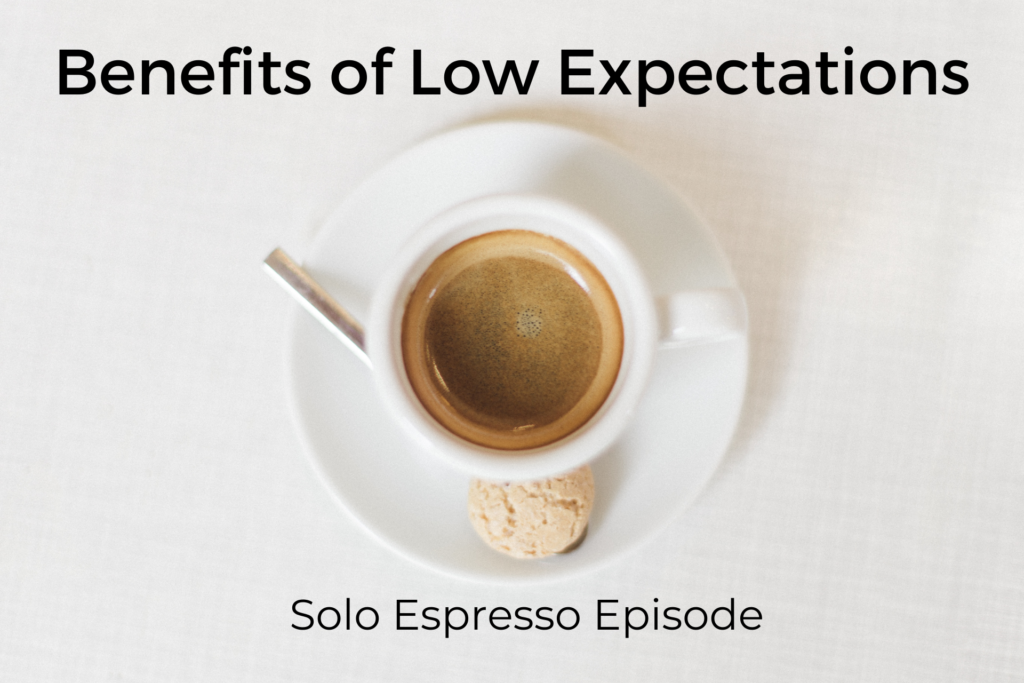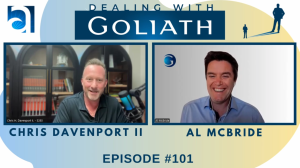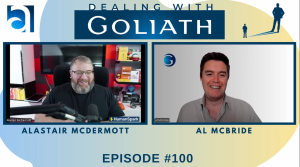Show Notes:
- Why you might want to travel to places you don’t particularly want to go
- Lowering the bar brings freedom
- Expectation as a form of belief
- The downside of being so goal orientated
- Balancing the sphere and the spear
- Reflection time is key
- Stepping back from being so mission orientated, can increase the chances of success
Transcript
Al McBride 0:06
Welcome to the dealing with Goliath podcast. This is a solo episodes that I call the benefits of low expectations.
Al McBride 0:18
So I was thinking about this the other day that back in 2013 I went to Australia. There’s this rugby tour called the lions tour. So there’s a selection of players like a super team, if you like of Ireland, England, Scotland, Wales, go on tour and play in either Australia, New Zealand, or South Africa. This time in 2013, it was in Australia. It’s a rotating tour that happens every four years.
Al McBride 0:54
It’s kind of a big honor for players to be selected all this sort of stuff. And they play quite a few games, there’s usually three major Test matches. Anyway, friend of mine, pretty much talks me into going I had never particularly wanted to be in Australia ever.
Al McBride 1:12
I’ve nothing against Australia. But you know, the way you just have one of these mental lists that you’re not even maybe aware of. But when when an opportunity comes up, you think now I’m not really that bothered, you know, there’s so many other places I’d rather go.
Al McBride 1:28
But anyway, who’s only friends down there been amazing tournament and exciting thing. And it would be it would be a brilliant trip. So I said, Yeah, why not? You know what, let’s, let’s do it the best, best excuse and best reason for me to want to go to Australia.
Al McBride 1:50
As I said, I have no particular interest in Australia and nothing against it, but just never grabbed me a sore that I particularly wanted to go, you know. And I have to say I had an absolutely fantastic time. The place the people, I think it was some of the best produce of food, and general Food Standards I’d ever had.
Al McBride 2:17
The weather was extraordinary. The coastline in Sydney just blew my mind. It was extraordinarily beautiful. We were in Melbourne as well, but I was kind of dazed and confused with jet lag there. So I don’t, I don’t actually remember Melbourne that much.
Al McBride 2:33
But I was blown away by Sydney I was there for three weeks. It still kind of affects me that when you go somewhere where you have such low expectation the bar is so low, that it’s probably actually quite easy for the place to impress, to make a really positive impression.
Al McBride 3:00
I mean, the other example of that, my cousin and dear friend of mine has lived in Dubai for many years and I promise I go visit and I never really had that much of an interest, let’s be honest to go to Dubai. But cousin is there a lot of time for the cousin so Yeah, why not?
Al McBride 3:20
I managed to make one of these as my friends call it double barrel trips. You know where I do a lot of these were the cheapest was through Istanbul in Turkey. So I visited a friend there and a phenomenal five or seven days. And then as a complete comparison was in Dubai for five or seven days.
Al McBride 3:40
Again, Dubai. No interest beforehand going I wouldn’t have gone there without my cousin being there. But once there she brought me to some very interesting places. Food was super weather was 28 degrees, what’s that? And 90 degrees or something? In November, okay, there’s something to be said for this. I was fascinating.
Al McBride 4:06
Again, it was another one of those examples that when the bar was so low, that your expectations were down there that it was easy for to impress, because it’s almost like when the expedition is low, you’re almost childlike in your exploration, you’re just the expectations have dropped away.
Al McBride 4:28
Because what are expectations are a form of belief. You’re saying this is what I believe this place to be or this is what I believe this business service or this film is going to be like or this client is going to be like or the supplier is going to be like you have an expectation. But when that’s removed, it’s amazingly freeing.
Al McBride 4:54
You can it’s almost like you you’re removing maybe the goal, you’re removing almost an objective sense of the thing, and are able to appreciate it and accept what you get with less of a filter, it’s almost being able to appreciate something and accept what you’re getting in a more moment to moment basis, then some sort of goal that you have this expectation, you’re going to have a great time or this is going to be a fantastic deal.
Al McBride 5:28
Now, don’t for a second think that I’m saying you shouldn’t have goals that I’m saying you shouldn’t have high expectations, particularly of oneself and one’s performance at things, it’s great to be aiming very high. And to have high standards that you ask, and requests, either your clients or suppliers or colleagues or whatever to step up to.
Al McBride 5:51
But I’m just sort of good that that’s the norm that’s a normal, I’m just trying to give the flip side of that maybe a different perspective. One thing that I did touch on, so this lightness of expectation was this idea that I regularly have in my head, two parts of me.
Al McBride 6:11
There’s many little parts of Al but the main ones that are often in conflict that I keep trying to unify and sometimes they are, but I call it the sphere and the spear so the sphere is like this sort of Buddha owl his super chilled full of love for the world, what happens happens, accepting and empathetic and very generous and all that zero ambition, right?
Al McBride 6:42
Everything’s gonna be fine, this kind of thing, right? And the other is the spear. Now, this is the aggressive alpha entrepreneur, get your ass in gear, get out there. This is like super high standards, hard charger type stuff. And as you can imagine, there’s often one plays off against the other.
Al McBride 7:04
What’s interesting, I think about lowering those expectations just for as a travel example. Because it really helps the Buddha out to just just flow and just accept and see, you know, that’s interesting.
Al McBride 7:21
Let’s go over there. I know that says yes. And you’re more gently observant, you’re aware more, I think rather than being mission orientated towards having a certain type of time, a certain type of experience. And this is something as to the the ongoing interaction, sometimes it’s a battle, sometimes it’s much more in alliance between buddha Al and more alpha aggressive owl is exactly that balance is that interplay of the different types of experience you have when you’re in that different, very different headspace.
Al McBride 8:02
When you maybe appreciate process more, you’re able to stop and smell the roses, smell the coffee, and enjoy those little moments, moment by moment, which is very much what Australia was like. Compared to, as I said, doing that goal focused mission orientated, trying to get a certain experience out of it.
Al McBride 8:24
I read a study years ago that Japanese and American tourists are the most goal oriented tourists, would you believe that they that they have this huge checklist. I think it’s because the the idea was for an awful lot of Japanese and supposedly American, this is what the study said, I don’t know how accurate it is.
Al McBride 8:43
But they feel that they have to be nearly doing things very task oriented type of tourists, type of visitors when they’re on on vacation on holiday. And as I said, then this this lowering of expectations was just opened up the field of possibility.
Al McBride 9:01
Because when you’re not on mission, then you have possibility. And this is something that I oddly enough, just realized right now is what I encourage my clients I usually try and get them to do and I I am terrible man for this.
Al McBride 9:16
I dropped the ball on this all the time. try and encourage them to just have half an hour and then an hour and then 90 minutes a week to stop and actually reflect what worked what didn’t?
Al McBride 9:31
That’s kind of in an analysis way but it’s also much more than in the spirit of as I said finding that Buddha self you know that inner calm to actually go? What am I really about where am I really wanting to go and more in a general journey a direction of experience rather than necessarily a very solid distinct destination.
Al McBride 9:59
It can be hugely freeing to mix up both because then when you go back into the hard charger who’s super goal focused, mission orientated, all that stuff, you’re coming back from it from the opposite.
Al McBride 10:14
So you’re seeing things a fresh, you’re seeing the some of the books are still there to see those opportunities rather than just having the blinkers on and going for one thing, and this comes up in negotiation quite a lot where people get very tunnel visioned.
Al McBride 10:31
There’s a great phrase, I don’t know if it was Chris Voss or was it Stuart Diamond, but I think both of them actually said it was never be so focused on what you want, that you wouldn’t take something better.
Al McBride 10:44
I think it’s very much those people who are in that hard charger. Now, sometimes those people won’t take something better because they’re nervous. And they’re tunnel vision because of their emotional sense their emotional state, which is fair enough.
Al McBride 11:02
That’s a different issue. But others, I think they’re just fixated on a particular goal, but forget why they want the goal. And of course, this is in my, you know, my little negotiation preparation cheat sheet, which is all about this is is that Yeah, be clear on what you want.
Al McBride 11:21
Absolutely. It’s amazing how few people really are. But far more importantly, is what’s the purpose? What’s the purpose to serve? What’s that? If I get that, what’s that need that’s being met for me for my business, for whatever the need it is that you’re trying to serve.
Al McBride 11:38
When you get clear on the why, then you can then you have huge flexibility, because you have multiple ways to meet that purpose. And it means that your farm, ironically, by understanding the pi by coming bit more into that sphere, rather than just the spear, that you can actually increase your likelihood of getting what you want, precisely because you’re able to be more dynamic in the ways to feed that.
Al McBride 12:08
That comes from stepping back and being a little removed from us with some regularity. So try that try taking 20 minutes 10 minutes, like asking yourself in a more arm’s length way, why am I doing what I’m doing? What’s the goal?
Al McBride 12:26
What’s the objective here, but more as I said in a journey and who you’re where your business is growing, and who you’re growing into being, rather than necessarily purely in a destination, goal sort of way.
Transcribed by https://otter.ai
Resources
PsychologyToday: The Secret to Happiness and Compassion: Low Expectations



